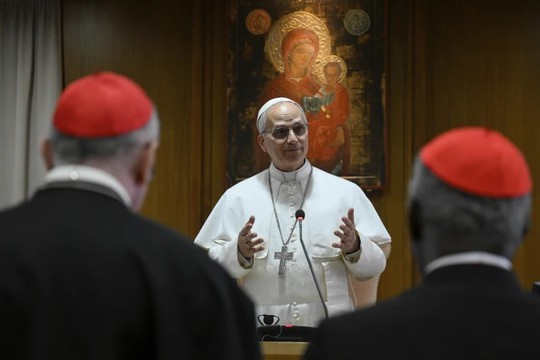Pope Leo XIV meets the College of Cardinals in the New Synod Hall at the Vatican, Saturday, May 10, 2025.
Photo: Vatican Media via AP
Pope Leo XIV laid out the vision of his papacy Saturday, identifying artificial intelligece as one of the most critical matters facing humanity and vowing to continue with some of the core priorities of Pope Francis, AP reports.
But in a sign he was making the papacy very much his own, Leo made his first outing since his election, traveling to a sanctuary south of Rome that is dedicated to the Madonna and is of particular significance to his Augustinian order and his namesake, Pope Leo XIII.
After praying in the church, Leo greeted the townspeople and told them they had both a gift and a responsibility in having the Madonna in their midst. He offered a blessing and then got back into the passenger seat of the car, a black Volkswagen. En route back to the Vatican, he stopped to pray at Francis’ tomb at St. Mary Major Basilica.
The after-lunch outing came after Leo presided over his first formal audience, with the cardinals who elected him pope. In it Leo repeatedly cited Francis and the Argentine pope’s own 2013 mission statement, making clear a commitment to making the Catholic Church more inclusive and attentive to the faithful and a church that looks out for the “least and rejected.”
Leo, the first American pope, told the cardinals that he was fully committed to the reforms of the Second Vatican Council, the 1960s meetings that modernized the church. He identified AI as one of the main issues facing humanity, saying it poses challenges to defending human dignity, justice and labor.
Leo referred to AI in explaining the choice of his name: His namesake, Pope Leo XIII, was pope from 1878 to 1903 and laid the foundation for modern Catholic social thought. He did so most famously with his 1891 encyclical Rerum Novarum, which addressed workers’ rights and capitalism at the dawn of the industrial age. The late pope criticized both laissez-faire capitalism and state-centric socialism, giving shape to a distinctly Catholic vein of economic teaching.
In his remarks Saturday, Leo said he identified with his predecessor.
“In our own day, the church offers everyone the treasury of its social teaching in response to another industrial revolution and to developments in the field of artificial intelligence that pose new challenges for the defense of human dignity, justice and labor,” he said.
Toward the end of his pontificate, Francis became increasingly vocal about the threats to humanity posed by AI and called for an international treaty to regulate it.
In the speech, delivered in Italian in the Vatican’s synod hall — not the Apostolic Palace — Leo made repeated references to Francis and the mourning over his death. He held up Francis’ 2013 mission statement, “The Joy of the Gospel,” as something of his own marching orders.
Again, referring to Francis’ 2013 mission statement, Leo cited the need for the church to express “loving care for the least and rejected” and engage in courageous dialogue with the contemporary world.
Prevost was elected the 267th pontiff on Thursday on the fourth ballot of the conclave, an exceptionally fast outcome given this was the largest and most geographically diverse conclave in history and not all cardinals knew one another before arriving in Rome.
Madagascar Cardinal Désiré Tsarahazana told reporters on Saturday that on the final ballot, Prevost had received “more” than 100 of the 133 votes. That suggests an extraordinary margin, well beyond the two-thirds, or 89 votes, necessary to be elected.
read more in our Telegram-channel https://t.me/The_International_Affairs

 11:06 12.05.2025 •
11:06 12.05.2025 •























